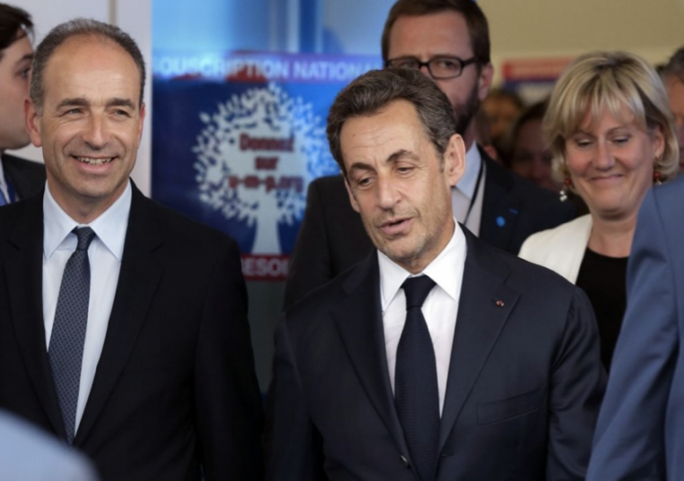According to his supporters, Nicolas Sarkozy has been re-energised by the Right's successes in France's départemental or county elections. “The wonderful atmosphere of 2007 is back,” says UMP senator Pierre Charon, one of the former president's close allies, referring to the year Sarkozy became president. Sarkozy himself, who up to now has had a difficult comeback after being elected as head of the UMP last year, is convinced that he won a decisive victory in Sunday's second round of elections at département level.
These is no dispute that it was a clear-cut win. The UMP and its allies in the centre have won control of 25 département councils, leaving them in charge in no fewer than 66 councils. Among the départements to be toppled were old bastions of the Left such as the Bouches-du-Rhône in the south, the Corrèze – political stronghold of President François Hollande, the Essonne – stronghold of prime minister Manuel Valls – the Nord and the Seine-Maritime. But Sarkozy also believes that it was not just a win for the Right, but that it was also a personal victory for him. “Our political family has never won so many départements,” said the leader of the opposition, who saw the vote as a “clear rejection” of the policies and the “lies, denial and impotence” of the current administration. However, what he did not point out was that unlike previous départemental elections, when only a proportion of council seats were up for renewal, this year all councillors faced re-election. This made it more likely that any change of political direction would be more pronounced.
And in fact, contrary to the suggestions of Sarkozy's supporters, who imply that Sunday's win was largely down to their champion's return to the political fray, the victory is simply one in a series of successes for the Right that date back to early 2014. This was a period when Jean-François Copé was head of the UMP and Sarkozy was spending more time on his lucrative public-speaking circuit than with his political family. In March 2014, for example, Copé spoke about a “blue wave” - a reference to the Right's political colours – after local elections in France's cities, towns and villages. “It's satisfying to see that the strategy that I have advocated is bearing fruit,” said Copé at the time, before he was forced to resign over the Bygmalion election funding scandal.

Enlargement : Illustration 2

After those council elections came the European and Senate elections, both of which saw heavy losses for the Left and significant gains for the Right. At the same time the far-right Front National showed that it was gaining electoral ground across the whole of the country. Though Nicolas Sarkozy has claimed he is a bulwark against the far right, the continuing successes of Marine Le Pen's party suggest his mere presence on the political landscape is not enough to stop its rise.
In addition, the ex-head of state seems to have forgotten that his political movement lost all the local elections held between 2004 and 2012, the period in which Sarkozy was the dominant figure on the Right. Marine Le Pen, however, has not forgotten. “I don't believe he has momentum,” the president of the FN told Le Monde after Sunday's results. “It's a Pyrrhic victory, an automatic victory linked to [the Right's] existing presence on the ground and the election system. There is absolutely no momentum in relation to the European elections.” Whether this election victory was “automatic” or not, Sarkozy sees it as a sign of “hope”, a hope that he wants to embody himself ahead of the primary elections in 2016 which will choose the Right's candidate for the 2017 presidential election.
This is the reason why Sarkozy was so quick to move the debate on to the period after the départemental elections. First of all he promised to “put into action [the] campaign commitments”. This was the only way, he said, to “restore credibility to political promises”. This is his method of responding to all those who criticise his return to politics by recalling the promises he made in his 2007 election campaign and which he did not keep during his subsequent five-year term of office. Then he laid out several policy objectives to be pursued, including the end of “unnecessary public spending”, a tighter control over local taxes and a fight against the “benefits culture”, a subject dear to the heart of the UMP's right-wing secretary general Laurent Wauquiez.
However, Nicolas Sarkozy's opponents inside the UMP are not planning to allow him to hog all the political limelight. As he had done after the first round of voting, the UMP mayor of Bordeaux Alain Juppé, who is already a candidate for the Right's primary elections, acclaimed a “victory for the UMP-UDI-MoDem strategy”. It is a strategy he has advocated for some months, regularly earning him boos from UMP activists. This three-pronged approach, which includes the centrist MoDem, led by François Bayrou, marks Juppé out from Sarkozy, who has supported just a UMP-UDI alliance. The former president continues to shun Bayrou after the latter called on his supporters to vote for François Hollande rather than Sarkozy in the second round of the 2012 election.
Another UMP presidential hopeful for 2017, Bruno Le Maire, has also been careful to point out that “no one can take all the credit” for the Right's victory. “It's a victory in which the president of the UMP has played a full part but above all it remains a collective victory and a win for our candidates on the ground,” Le Maire told Le Monde.
-------------------------------------------------------------------------
- The French version of this article can be found here.
English version by Michael Streeter


